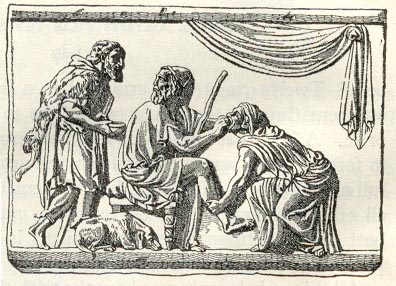![]()
Masterpieces of Western Literature
| Unit 8 |
|
English 201:
Masterpieces of Western Literature |
| .Unit 8 Reading | Course Reading | Entry Page |
| Introduction | Background | .Explication | Questions | Review |
The theme for this unit is obvious, is it not? The good guys must win. If the bad guys win, civilization is doomed. The world will be given to vicious children. So our theme is righteousness.
Oedipus Again:The
suitors say they wish to marry PEN. This is not very plausible.
OD has been absent for 20 years. PEN must be 40 years old; most of
the suitors are in their early 20s. Antinoos must be only slightly
older than TEL. He says he remembers OD "from childhood." OD
was a foster father to Antinoos. Eurymakhos sleeps with Melanthio,
whom PEN adopted as a daughter:
18.361 taken as ward in
childhood by PEN
. . . [who] raised her as her own.
It is clear that Homer renders the suitors
as spoiled children. The generational age difference between the
suitors & PEN/OD suggests that the Oedipal complex is again at work.
These young men do not wish to marry PEN as much as to prove that they
are adults, that they are the men as powerful as OD. Eurymakhos'
quick response to PEN/mom reveals their anxiety:
21.336 We hear some jackal
whispering:
"How far inferior to the great husband
her suitors are!"
Slightly earlier, Eurymakhos had confessed:
21.260 the worst
is humiliation--to be shown up
for children
measured against OD . . . .
What shame to be repeated of us . . . !
The suitors represent a stage of human
growth & development that precedes the world of The Iliad.
They are mamma's boys, which is to say that they expect their mothers to
intercede for them to prevent trouble. Remember AK rejecting his
mother's intercession?
18.147 though you love
me; you cannot make me listen
AK dares to be a man, which -- among other
things -- means that he faces death. Not one of the suitors has such
maturity & consequently none of them is ready to be a man. These
boys see violence as a kind of funny accident, like laughing at a toddler
who falls down because he has not yet mastered the balance involved in
walking. Those grim scenes of atrocity in The Iliad present
a terror & depth that these children could only giggle at. These
boys need their mammas, not wives. Only a survivor of the The
Iliad -- a man who has felt power -- is ready for a wife & children.
Who comes, too late, to rescue the delinquent boys? Their fathers.
Even here we see a slight joke on this theme, when Laertes (not OD) slays
Eupeithes (the father of Antinoos), who is OD's age -- i.e., the age of
his son.

Marriage:We
know that PEN (like Arete, Nausikaa, Ino, & Athena herself) is committed
to civil values:
19.367 The
hard man & his cruelties will be
cursed behind his back, & mocked in death.
But one whose heart & ways are kind--of him
strangers will bear report to the wide world,
& distant men will praise him.
How well does this work out
in the absence of power (OD)? The vicious children (suitors) mock
such weakness. They plan murder, that they never have the daring
or power to commit, while they charm the victim's mother! Brutal
power that destroys even itself is less repugnant than this. At least
it is clean & forthright. In contrast, when the world is given
to mothers they produce the pathology illustrated by Eurymakhos & Melanthios.
Neither power is complete. Each needs the other. When PEN seems
to spurn the altar of the marriage bed (by instructing Eurykleia to remove
it from her bedroom), OD grows angry. PEN says:
23.211 Do
not rage at me, OD!
No one [but me] ever matched your caution!
23.220 Helen
of Argos, daughter of Zeus & Lead,
would she have joined the stranger [Paris], lain with him,
if she had known her destiny?
PEN suggests that she is
just as committed to the culture of the mind as OD. They are married
(or fellow citizens) because they are both committed to the same vision;
they have the same hopes & concerns that make them allies & comrades,
instead of potential adversaries in the war of the sexes. Children,
such as the suitors (or Paris & Helen), are not mature enough to have
commitments to anything but their immediate emotions. The marriage image
is present in the form of a paradox that the Greeks trusted was closer
to reality (cf. Chinese yin/yang) than some arbitrary & unstable fiat:
24.568 Both
parties later swore to terms of peace
set by their arbiter, Athena, daughter
of Zeus . . .
though still she kept the form & voice of Mentor.
Athena is obviously female, the daughter of Zeus. But she is also male, with the form & voice of Mentor. She is also a child, the daughter of Zeus. She is the family. She is the city. The virginal wife of power, she is the mother of civilization.

Telemakhos & Penelope
Click on the next section: Background
above.